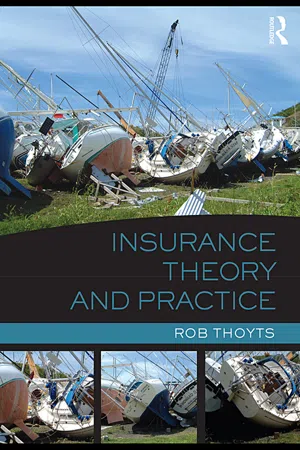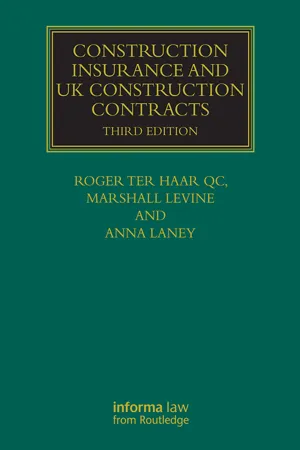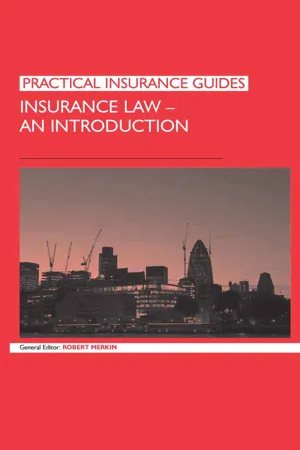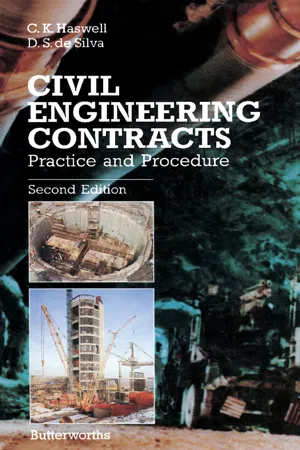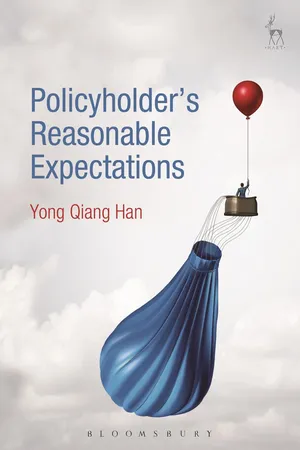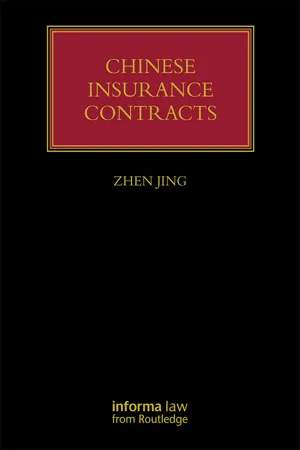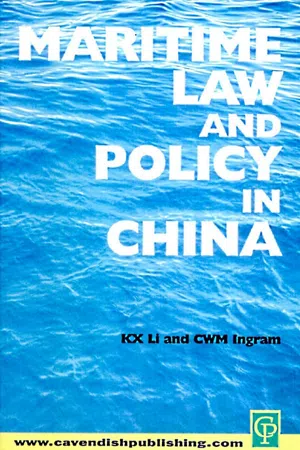Law
Insurance Law
Insurance law encompasses the legal principles and regulations that govern the insurance industry. It covers various aspects such as the formation and interpretation of insurance contracts, the duties and obligations of insurers and policyholders, and the resolution of disputes related to insurance claims. This area of law aims to provide a framework for the fair and efficient operation of insurance markets.
Written by Perlego with AI-assistance
Related key terms
1 of 5
9 Key excerpts on "Insurance Law"
- eBook - ePub
- Rob Thoyts(Author)
- 2010(Publication Date)
- Routledge(Publisher)
2 Fundamental legal principles of insuranceAn insurance policy is a contract and is therefore governed by normal contractual legal principles, such as the requirement that there be offer and acceptance, consideration and capacity. Given that it is a commercial contract, an intention to create legal relations can be presumed. However, the nature of an insurance contract requires special legal treatment in order that the contract operates as intended. First, insurance policies are aleatory contracts. Although the premium (or the means of calculating the premium) is certain, the insurer’s obligations depend upon whether the insured event occurs and if so, its magnitude. Clear rules are required to determine the extent of such obligation. It is also important that the common pool operates as intended, which in turn requires the calculation of an equitable premium. As will be seen, legal intervention has been deemed necessary to ensure that the insurance concept works. Indeed, although there is significant scope for argument concerning the precise nature of such legal rules, their absence renders the insurance contract unworkable. It is therefore impossible to distinguish a rule of law from a principle of insurance, as the fundamental principles of insurance are essential to the proper operation of the insurance system and as such have to be supported by law if the contract is to be properly enforceable.Sources of Insurance Law
Our judges tell us that English common law was established in an inviolable form in 1189 and exists, ancient and unchanging. Occasionally, while applying this venerable system, they may find one of their distinguished predecessors may have strayed from the path of wisdom and incorrectly stated the law. In such circumstances this error will be corrected, but must not be considered as being a change in the common law. It has merely been revealed that for perhaps several centuries, we have been mistaken as to the law, which of course was permanently laid down in 1189, and has simply reverted to the purity of the original. Given that there was no recognisable insurance system operating in feudal England in 1189, it is therefore somewhat surprising to find that the common law is an important part of Insurance Law. The reality of course is that while adhering to core principles, judges have been inventing new law for new situations. - Roger ter Haar, Anna Laney, Marshall Levine(Authors)
- 2016(Publication Date)
- Informa Law from Routledge(Publisher)
Chapter 2General rules and principles of Insurance LawDefinition of insurance
2.1 Before considering the application of insurance to construction contracts it is necessary to consider the basic principles relating to contracts of insurance. This chapter is by no means comprehensive but should give the reader a good understanding.1 References in this chapter to “contract” are references to the contract of insurance.2.2 Insurance in the construction context is generally a contract to indemnify, i.e. the insured will recover compensation for his actual loss and in order to recover will have to prove his loss. This may occur where judgment has been given, or an award made, against the insured, or where, with the insurer’s consent, the insured has reached a settlement with the third party. The principle of indemnity will be implied into the contract. This type of contract should be distinguished from insurance contracts that promise to pay a specified sum upon the happening of an insured event (for example life insurance, contracts of guarantee or performance bonds).2.3 Despite the vast amount of legislation regulating insurance companies and the conduct of their business, there is no statutory definition of insurance. However, an excellent general description of the nature of insurance was given by Channell J in Prudential Insurance Co v IRC :2It must be a contract whereby for some consideration, usually but not necessarily in periodical payments called premiums, you secure to yourself some benefit, usually but not necessarily the payment of a sum of money, upon the happening of some event … the event should be one that involves some amount of uncertainty. There must be either uncertainty whether the event will happen or not, or if the event is one which must happen at some time there must be some uncertainty as to the time at which it will happen. The remaining essential is … that the insurance must be against something.- eBook - PDF
- Dilan Thampapillai, Claudio Bozzi, Vivi Tan, Anne Matthew(Authors)
- 2015(Publication Date)
- Cambridge University Press(Publisher)
9 INSURANCE Claudio Bozzi 9.0 Introduction This chapter will consider insurance as the formation of a contract of risk management between two parties (the insurer and the insured). It will consider the governance of that relationship of insurance by the statutory regime contained in the Insurance Contracts Act 1984 (Cth), and relevant amendment under the Insurance Contracts Amendment Act 2013 (Cth). It will address the formation and interpretation of the contract of insurance, and the duty of utmost good faith as it applies to both insureds and insurers. The construction of insurance contracts will be examined by reference to the principles of construction applicable to commercial contracts broadly, and insurance contracts in particular (for example, contra proferentem). This chapter will also address the type of breaches commonly encountered in insurance cases. It will finally consider the remedies available to insureds and insurers for breaches by misrepresentation, fraud and non-disclosure. 9.1 The nature of insurance in Australia Insurance is a form of ‘risk transfer’ that transfers the risk of potential events, such as accidents, or even certain events, such as the eventual death of the insured, from the insured to the insurer at a price calculated by the insurer and paid by the insured. All risk is essentially particular to the individual, but many forms of risk transfer are priced generally. For example, the likelihood of an automobile accident will depend on the driver’s personal characteristics and certain environmental factors. However, the insurance coverage for automobile accidents is priced as a retail product. There are three sources of Insurance Law in Australia. The first is the Insurance Contracts Act (‘the Act’). The second is the common law in respect of matters not covered by the Act. The third is the common law as modified by state legislation where such exists, in respect of those matters not covered by the Act. - eBook - ePub
- Robert Merkin(Author)
- 2014(Publication Date)
- Informa Law from Routledge(Publisher)
Much Insurance Law derives from case law, although there is a small amount of important legislation. Most significant is the Marine Insurance Act 1906, which codified the case law as it existed at that time (and which, despite its name, is in many regards applicable to insurance contracts which are not marine in nature). Other relevant legislation includes the Life Assurance Act 1774, which lays down formal requirements for life assurance contracts, and the Financial Services and Markets Act 2000, which deals with the regulation of insurance and other financial services in the United Kingdom. This legislation will be encountered throughout the book.FORMATION OF AN INSURANCE CONTRACTIntroduction
This section describes the legal rules which apply to the formation of an insurance contract. The usual rules of English contract law apply, so for a valid contract to come into being, there needs to be (i) an offer, (ii) an acceptance of that offer, (iii) valuable consideration, and (iv) certainty as to the material terms of the contract so that the courts are able to enforce the contract. We explain each of these below. We also describe the special “duty of utmost good faith” which applies in the formation of insurance contracts.We then consider the form of the contract, at what stage the insurer becomes “on risk”, and the provision of temporary cover in the interim.Offer
The normal method of obtaining insurance is for the party seeking insurance to complete a proposal form, and sometimes to provide further information known as an underwriting submission. This is usually provided to the insurer through an intermediary (an insurance broker).The insurer will decide whether or not it is willing to offer the insurance sought, and on what terms. For example, the insurer may insist that the insurance has exclusions for risks which it considers to be unacceptably high. The insurer will also set a price, which is likely to depend on the degree of risk and the amount of cover required.Acceptance
A binding contract will be deemed to arise when the insured and the insurer have agreed the key terms of the insurance. The normal analysis is that the insurer makes the offer of coverage to the insured, and that the offer is accepted by the insured showing consent to those terms by paying the premium or some other act. - eBook - PDF
Civil Engineering Contracts
Practice and Procedure
- Charles K. Haswell, Douglas S. de Silva(Authors)
- 2013(Publication Date)
- Butterworth-Heinemann(Publisher)
Chapter 9 Insurances Principles of insurance Insurance is a special type of contract under which a sum of money will be paid by the insurer on the happening of a specified event. The person to whom payment is made is the insured. It is, of course, uncertain whether the specified event will actually happen, and this uncertainty, in the context of the likelihood of the event happening and the consequences if it does, may be termed the risk. In calculating the premium that he requires to enter into the contract the insurer will be very much concerned in assessing that risk. Where the event is certain to take place, although there may be uncertainty as to when it will take place as in a policy securing payment on a person's death, the matter becomes one of assurance not insurance. Although it is possible to insure very many risks in today's insurance market, not all risks can be insured. In the United Kingdom insurance is subject to a set of legal rules as well as certain practices which stem from commercial and moral considerations. Before any insurance can be taken out it is a prerequisite that the insured must have an insurable interest in the subject matter of insurance. Basically this means that there has to be a legally recognizable relationship between the insured and that which is being insured, whereby he benefits from its continued safety or freedom from liability and would be prejudiced by its damage, destruction, or the creation of liability. Insurance cannot be used as a device to cover speculative risks or for gambling. The insurance contract is a legally binding agreement between two or more parties. There is no legal requirement for insurance 115 116 Insurances contracts to be in writing unless they relate to certain aspects of marine insurance or are contracts of guarantee. However, in practice the insurance policy provides written evidence of the contract. - eBook - ePub
- Yong Qiang Han(Author)
- 2016(Publication Date)
- Hart Publishing(Publisher)
2 Contract Law and Insurance Law: the Homogeneity This chapter addresses the underlying and occasionally raised argument that insurance (contract) law is sui generis or distinctive from (general) contract law. The argument results from confusing the features of the economic rationale of insurance transactions with the legal framework of contract law that governs them. The chapter counter-argues that whilst insurance is indeed distinctive from non-insurance transactions, the prototype of which is sales, in respect of their economic rationales, it is possible for insurance and non-insurance transactions to have a shared legal framework that governs both. To substantiate that counter-argument, this chapter revisits the common legal framework that governs insurance contract and non-insurance contracts in respect of the formation of contract, the shared legal nature of performance of contract, with focus on performance by insurers, and the common legal nature of remedies for breach of contract. It is found that in these respects Insurance Law still operates within the framework of general contract law. The chapter also shows that the principles of interpretation of contracts in an insurance context and in non-insurance transactions are essentially the same. In addition, it considers seeming differences between Insurance Law and contract law in respect of the duty of disclosure, and the meanings of ‘conditions’ and ‘warranties’ - Jürgen Basedow, John Birds, Malcolm Clarke, Herman Cousy, Helmut Heiss, Leander Loacker(Authors)
- 2015(Publication Date)
- Verlag Dr. Otto Schmidt(Publisher)
Law of Insurance Supervision and Other Public Law on Insurance C4. Insurance contract law which forms the substance of the Principles of European In-surance Contract Law must be distinguished from the law of insurance supervision. In principle, the two areas of law are to be distinguished by using a formal approach asking whether legislators have created a rule of public rather than of contract law. However, for the purposes of the Principles of European Insurance Contract Law this formal approach is not entirely sufficient. Recourse to national supervisory law is excluded by virtue of Arti-cle 1:105 if the relevant rules regulate issues covered by the Principles of European Insurance Contract Law (see Article 1:105 Comment 3). Article 1:101 Substantive Scope of Application 61 International Insurance Contract Law (Conflict of Laws) C5. This matter is uniformly regulated across Europe by the Rome I Regulation (593/2008) and the Rome II Regulation (864/2007). While the Rome I Regulation (593/2008) entered into force on 17 December 2009, the Rome II Regulation (864/2007) has been in force since 11 January 2009. The Regulations replace the former European regime of international insurance contract law as embodied in the Rome Convention (80/934/EEC), the Life As-surance Consolidation Directive (2002/83/EC), the Second Non-Life Insurance Directive (88/357/EEC) and the Third Non-Life Insurance Directive (92/49/EEC) without essential changes. The Regulations contain conflict rules for insurance contracts but no substantive rule of insurance contract law. The aim of these rules of private international law to create a feasible basis of a European internal insurance market has failed. The Principles of Eu-ropean Insurance Contract Law focus on substantive insurance contract law which will be applicable if the parties opt in their favour.- eBook - ePub
Chinese Insurance Contracts
Law and Practice
- Zhen Jing(Author)
- 2016(Publication Date)
- Informa Law from Routledge(Publisher)
Electronic insurance business and insurance card transactions have become increasingly popular in China’s insurance market in recent years due to their advantages (simpler, quicker and cheaper) over the traditional type of insurance transactions. But the lack of legal rules to govern this kind of insurance activity gives rise to difficulties and many disputes in industrial and judicial practice. To keep pace with the rapid development of electronic insurance business and insurance card business, it is necessary to develop new legal rules to govern the contractual activities in order to facilitate healthy development of such business.4.7 Agreement on essential terms of an insurance contract
For a binding insurance contract, parties must reach an agreement on certain major terms. According to art. 18 of the Insurance Law, an insurance contract shall contain the following particulars:- (1) name and address of the insurer;
- (2) names and addresses of the proposer and the insured and, in the case of personal insurance, name and address of the beneficiary;
- (3) insured subject matter;
- (4) scope of cover and exclusions;
- (5) period of insurance and commencement of insurance liability;
- (6) sum insured;
- (7) premium and method of premium payment;
- (8) method of payment of indemnity or insurance benefits;
- (9) liabilities arising from breach of contract and resolution of disputes; and
- (10) the day, month and year of the signing of the contract.
- (1) the subject matter of the insurance;
- (2) insurance liability and exclusions of insurance liabilities;
- (3) duration of the insurance;
- (4) the amount of the insurance (the maximum amount of payment by the insurer); and
- (5) the amount of the premium. (The premium is the consideration given by the insured in return for the insurer’s undertaking to cover the risks insured against in the policy of insurance.)
- eBook - ePub
- Sharon Li, Colin Ingram(Authors)
- 2013(Publication Date)
- Routledge-Cavendish(Publisher)
PART 6Insurance Law OF THE PRC 1995
(Adopted at the 14th Session of the Standing Committee of the 8th National People’s Congress on 30 June 1995 and effective as of 1 October 1995)Chapter 1 General provisions
Article 1This law is formulated for the purpose of regulating insurance activities, protecting the lawful rights and interests of parties in insurance activities, strengthening the supervision and control of the insurance industry and promoting the healthy development of the insurance business.Article 2For the purposes of this law, the term ‘insurance’ shall refer to a commercial insurance act whereby a proposer pays a premium to an insurer in accordance with a contract while the insurer assumes liability for payment of insurance monies for property losses as a result of the occurrence of an event specified in the contract, or when the insured dies, becomes injured or disabled, falls ill or reaches the age or time limit as specified in the contract.Article 3This law shall apply to parties engaged in insurance activities within the People’s Republic of China.Article 4Parties engaged in insurance activities must abide by the laws and administrative regulations and adhere to the principles of voluntariness, honesty and trustworthiness.Article 5Entities engaged in commercial insurance business must be insurance companies established in accordance with this law. No other organisation or individual may engage in commercial insurance business.
Index pages curate the most relevant extracts from our library of academic textbooks. They’ve been created using an in-house natural language model (NLM), each adding context and meaning to key research topics.
